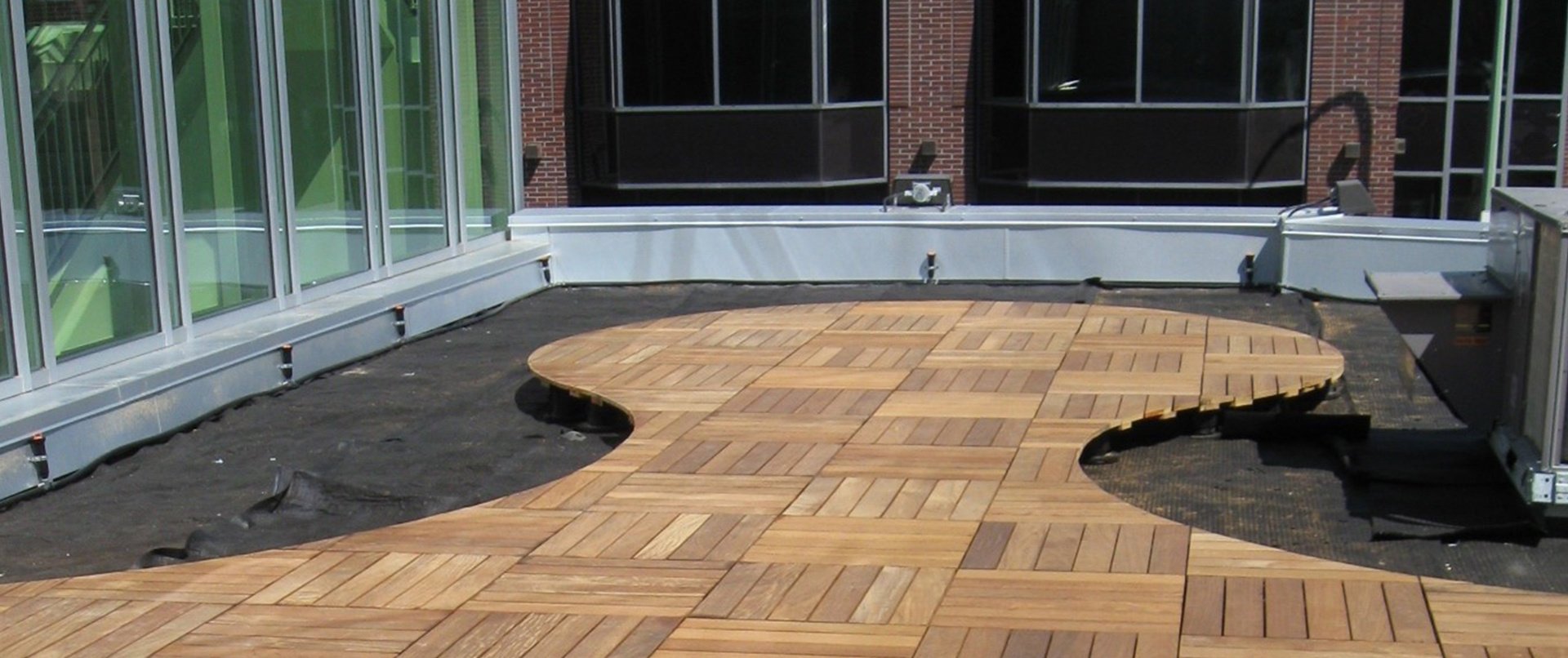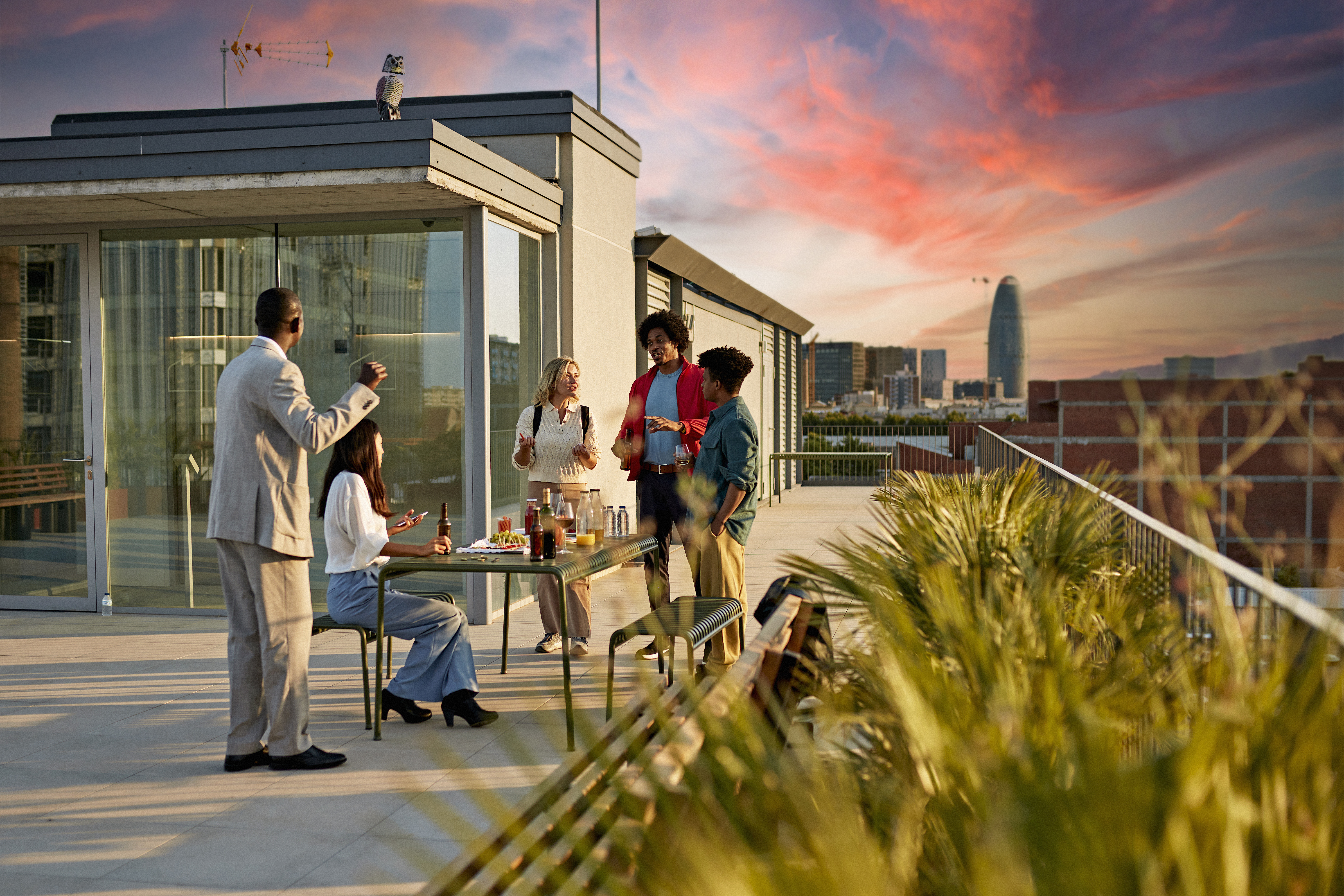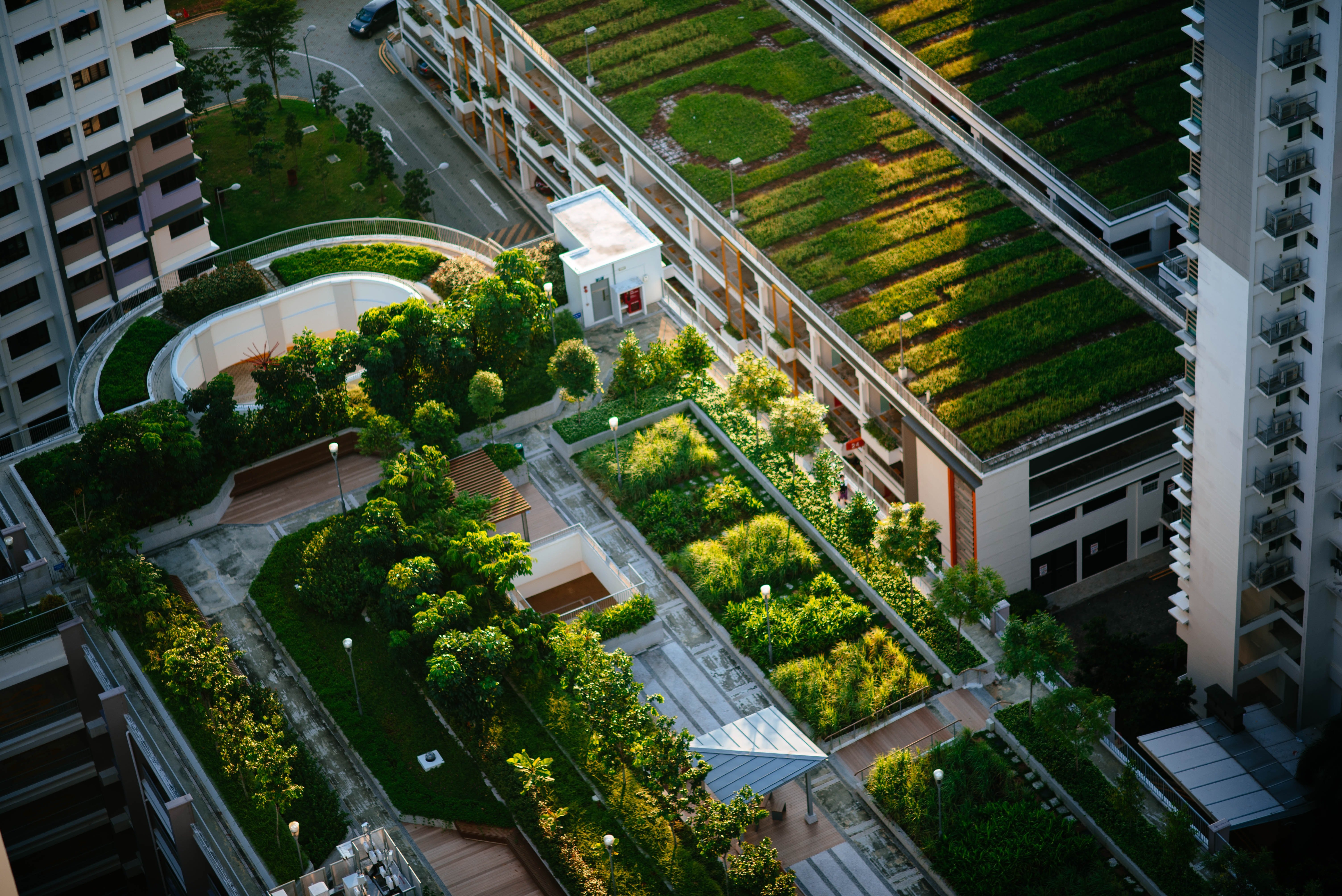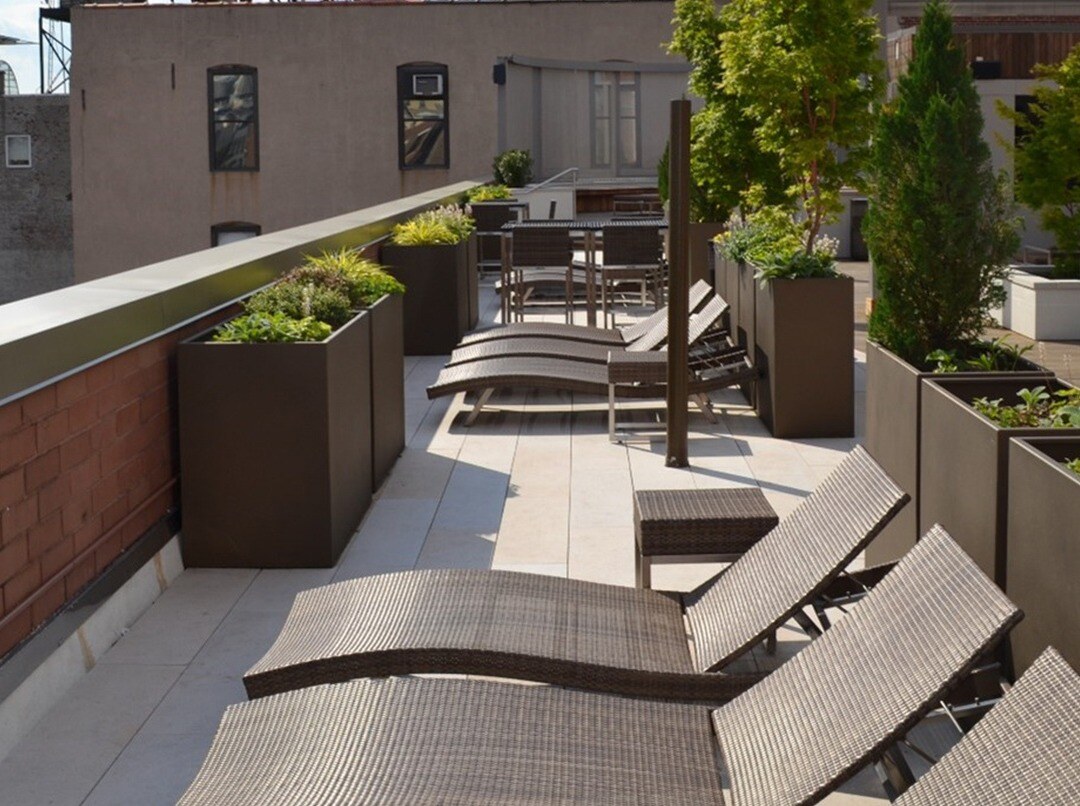When it comes to creating a stunning and functional outdoor urban space, decking for rooftop areas plays a crucial role. Whether you're looking to turn your rooftop into a tranquil space for solitary reflection, a vibrant social hub, or a sleek modern retreat, the right flooring is a key decision. This blog explores the various rooftop deck flooring options available, helping you make an informed decision that aligns with your vision and needs.
We'll delve into a range of materials suited for rooftop decks, each with its unique advantages and potential drawbacks. From the timeless charm of wood deck tiles to the contemporary allure of composite decking, the soft appeal of artificial turf to the industrial chic of concrete, there is something to cater to every aesthetic and functional requirement.
1. Wood Deck Tiles for Timeless Appeal

Wood deck tiles bring natural warmth and rustic charm to rooftop spaces. Made from hardwoods like teak or ipe, these interlocking tiles create a seamless, visually appealing surface, transforming urban rooftops into inviting retreats connected to nature.
Pros: Natural Beauty, Versatility, and Easy Installation
Wood deck tiles are celebrated for their natural beauty and rich grains. They are versatile, allowing for unique patterns and designs, and easy to install, making them ideal for DIY projects. FSC-certified wood and bamboo tiles offer sustainable options. High quality Ipe tiles are resistant to moisture, insects, and other forms of damage.
Cons: Maintenance Requirements and Susceptibility to Weathering
Most wood deck tiles require regular maintenance, such as sealing and staining, if you want to maintain the initial color. Or, you can simply allow it to weather and turn silver. Both looks are appealing.
2. Composite Decking for Your Rooftop Patio
Composite decking offers a modern solution for those seeking durability and low maintenance for their rooftop deck. Made from a blend of wood fibers and recycled plastics, composite decking combines the natural look of wood with enhanced longevity and resilience. This material is an option for those who want a contemporary style with minimal upkeep.
Pros: Low Maintenance, Durability, and Eco-Friendly Features
One of the biggest advantages of composite decking is its low maintenance requirements. Unlike traditional wood, composite decking doesn’t need regular sealing, staining, or painting. It is highly durable and resistant to rot, splintering, and insect damage, ensuring a long-lasting investment. Additionally, using recycled materials might make composite decking an eco-friendly choice.
Cons: Initial Cost and Limited Color Options
Composite decking can have a high initial cost. Additionally, although there are many designs available, the color options may be more limited compared to natural wood. It also won’t feel the same underfoot as real wood.
3. 2CM Pavers

2CM pavers offer a refined and sophisticated surface option for rooftop decks, elevating the aesthetic appeal of any outdoor space. These sleek pavers come in various designs and textures, allowing for customization to suit different styles and preferences. Whether you're aiming for a contemporary look or a more traditional feel, 2CM pavers can provide the elegance you desire.
Pros: Resilience to Weather, Wide Range of Designs, and Textures
One of the key advantages of 2CM pavers is their resilience to weather conditions. These durable pavers can withstand harsh sunlight, heavy rain, and freezing temperatures without cracking or fading, ensuring long-term performance. Moreover, they offer a wide range of designs and textures, from sleek modern finishes to textured surfaces that mimic natural stone.
Cons: Potential Slipperiness When Wet Unless High-Quality Slip-Resistant Products Are Used
One potential drawback of 2CM pavers is their susceptibility to becoming slippery when wet. This can pose a safety hazard, especially in areas prone to rain or dew. To mitigate this risk, invest in high-quality slip-resistant products or coatings.
4. Artificial Turf for a Green Haven
Artificial turf offers an easy solution for urban rooftops, bringing lush greenery without the maintenance of real grass. This synthetic alternative creates a soft, inviting surface perfect for relaxation and play.
Pros: Low Maintenance, Soft Texture, Natural Look
Artificial turf requires minimal upkeep, eliminating the need for watering or mowing. Its soft texture can provide comfort underfoot, while its natural appearance enhances rooftop aesthetics.
Cons: Heat Retention, Drainage Issues, Limited Lifespan
However, artificial turf can retain heat, making it uncomfortable in hot weather. Proper drainage is crucial to prevent water buildup and potential mold. Additionally, it has a limited lifespan compared to other options, requiring regular replacement.
5. Rubber Pavers for Comfortable and Safe Rooftop Deck Flooring
Rubber pavers provide a soft, slip-resistant surface for rooftop decks, prioritizing comfort and safety. With shock absorption and easy installation, they offer practicality for various activities.
Pros: Comfortable, Easy Installation, Noise Reduction
Rubber pavers absorb shocks, ensuring comfort during prolonged use, and are quick to install. They may also dampen noise, ideal for rooftop environments.
Cons: Limited Aesthetics, Fading Over Time
While available in various colors and textures, they don’t offer the same high quality visual and tactile impact as natural materials. Additionally, prolonged exposure to sunlight can cause rubber pavers to fade and degrade over time.
6. Glass Tiles for Elegance and Sophistication
Glass tiles add a touch of luxury and modernity to rooftop decks, effortlessly elevating their aesthetic appeal. With their sleek and glossy finish, glass tiles create a sophisticated ambiance, making them a popular choice for upscale rooftop settings.
Pros: High-End Appeal, Durability, Heat Resistance
Glass tiles exude high-end elegance, enhancing the overall aesthetic of rooftop spaces. They are durable and able to withstand heavy foot traffic and harsh weather conditions. Additionally, glass tiles offer excellent heat resistance, making them suitable for rooftop decks exposed to direct sunlight.
Cons: Installation Cost, Potential for Staining and Slipping
Glass tiles are not the cheapest option for rooftop flooring. Lower quality products may be prone to staining, requiring regular maintenance to preserve their pristine appearance. Furthermore, some glass tiles may become slippery when wet, posing a safety hazard unless proper precautions are taken to reduce slip and fall hazards.
7. Concrete Decking for an Industrial Vibe
Concrete flooring provides a versatile and stylish option for rooftop decks, adding an industrial-chic aesthetic to outdoor spaces. With its clean lines and minimalist appeal, concrete complements modern and urban design themes, making it a popular choice for contemporary rooftop environments.
Pros: Durability, Customization Options, Low Maintenance
One of the main advantages of concrete is its exceptional durability, capable of withstanding heavy foot traffic and harsh weather conditions without deteriorating. Concrete also offers extensive customization options, allowing for various finishes, textures, and colors to suit different design preferences. Furthermore, concrete requires minimal maintenance.
Cons: Prone to Cracking, Sealing Required for Longevity
Concrete can be challenging to deploy on a rooftop, and it can be prone to cracking over time, especially in regions with extreme temperature fluctuations or seismic activity. Proper installation and maintenance, including regular sealing, are essential to enhance its longevity and prevent damage.
Elevating Your Rooftop Experience
Selecting the perfect flooring for your rooftop deck is essential for creating a stylish, comfortable, and functional outdoor space. Whether you opt for the classic appeal of wood deck tiles, the modern versatility of composite decking, or the luxurious allure of glass tiles, prioritizing quality and considering factors such as budget, climate, and personal style ensures a lasting investment.
By transforming your rooftop into a vibrant extension of your living space with high-quality flooring materials, you not only enhance your lifestyle but also add value to your property, creating a welcoming oasis for relaxation, entertainment, and enjoyment for years to come.
For more info on flooring for your rooftop, check out our other blogs:
Important Notice: Bison Innovative Products recommends that all rooftop deck systems should be installed by a licensed contractor with at least 2 years of proven experience. Plans/designs for a rooftop deck should be reviewed by a safety/structural engineer before commencing construction. The roof must be able to safely carry the static and live load weights of the rooftop deck, and any amenities added along with the appropriate density of any insulation to resist crushing and damaging the waterproof membrane. Adding items such as hardscaping features, hot tubs, or pools to a rooftop deck requires additional guidance and oversight from an engineer. Property owners should research and abide by any building codes and other regulations to obtain the required permits prior to having a rooftop deck installed. Please read all product specifications posted on Bisonip.com to review all information prior to any installation.
.png?width=100&height=100&name=BisonIP-logo-PMS425-2023%20(1).png)



